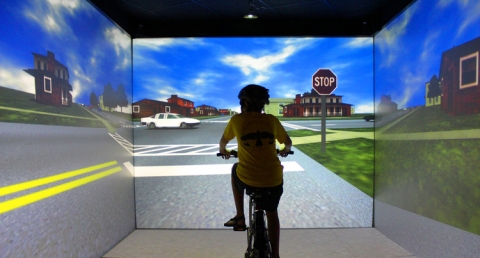DeLTA Center Roundtable - Jodie Plumert (University of Iowa)

Jodie Plumert, Professor and Chair, Starch Faculty Fellow in the Department of Psychological & Brain Sciences, will discuss her research for the DeLTA Center.
Dr. Plumert’s research interests include “risk taking in typically- and atypically-developing populations, perceptual-motor development, unintentional childhood injuries, parent-child communication, development of spatial memory and communication”.
From the Department of Psychological & Brain Sciences, U of Iowa, 9 December 2016, https://psychology.uiowa.edu/people/jodie-plumert.
Timing Is (Almost) Everything: How Children and Adults Cross Roads in an Immersive Virtual Environment
Abstract: Moving the self in relation to other moving objects is critical for adaptive functioning. This can either involve avoiding other moving objects (e.g., crossing a street) or contacting other moving objects (e.g., stepping onto an escalator). A critical aspect of successfully moving in relation to other moving objects is accurately perceiving affordances, or possibilities for action that depend on the relationship between the characteristics of the perceiver and the properties of the environment. In our work, we use road crossing as a model system for understanding how children learn to perceive and act on dynamic affordances (i.e., possibilities for action that change over time). Six- to 14-year-old children and adults bicycle or walk across intersections with continuous cross traffic in an immersive virtual environment. We consistently find that there are developmental and individual differences in children’s ability to tightly time their entry into the roadway relative to the lead car in the gap. Given that children generally do not adjust their gap choices to match their poorer timing abilities, children engage in riskier road crossing than adults. The talk will conclude with a discussion of possible reasons for these developmental and individual differences in movement timing.
+ Coffee, water, and pastries will be provided
